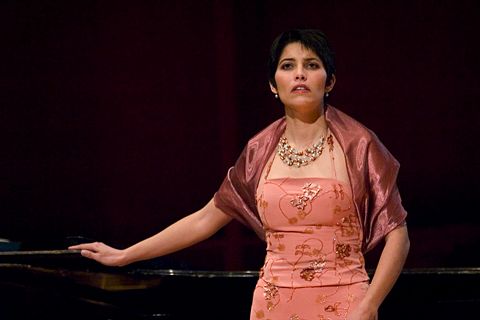|
<< -- 6 -- Maria Nockin HONEST WORK

MN: Was Ariodante your first trouser role?
VG: No, I had done Orsini in Donizetti's Lucrezia Borgia in a semi staged version that summer and after that I did the same composer's Alahor in Granata [listen -- 'Sire, deh, vieni affrettati' from Act II] in Seville. That was a full knock down drag out pants role! I even had facial hair: a beard and a moustache. It was a huge new production with an incredible set. I had a turban on, a scimitar at my side and made my entrance on a horse. At the première we had all sorts of incense burning on the stage. The horse had an allergic reaction and began sneezing uncontrollably with me on his back. It was as though the ground was heaving under me and I had no idea of what I could do when I had to sing. Luckily he stopped just as we arrived on stage!
MN: What are your thoughts on decorating a da capo aria?
VG: I'm all for it! For me ornamentation is really necessary. If you look at the singers for whom many of these things were written you could make the point that some of them were over done. Maybe some of their decoration was not always tasteful, but each singer definitely had his/her own following and ornamentation was expected. When Gluck wrote Orfeo and said it was not to be ornamented because the audience was to pay attention to the drama instead of the vocal pyrotechnics, he was making a 180 degree turn and asking people to look at opera backwards. I think you need to perform Baroque pieces in such a way that the audience gets a kick out of them. It's entertainment, after all, not just musicology and ancient history. The artist and the audience need to have a good time and ornamentation is great for that.
I sing Baroque music one way with René Jacobs because I know what his musical language is, and I sing it differently for another conductor. René really kneads the music and he encourages the singer to do that also. He wants you to really get in there and work with it as though it were dough. You jump into the mosh pit and get completely dirty with the music. It's wonderful!
It may be that the way one sings Baroque music now has nothing to do with the way it was sung then. It's entertainment and audiences have changed as well. If you want to entertain, you have to interpret the music for today's audiences and have your own take on it. Today you can't just stand on the stage and sing. You have to do a lot more than that.
MN: How much time do you devote to concerts and recitals?

Vivica Genaux in recital. Photo © Todd Paris/University of Alaska/Fairbanks
|
VG: Not so much. I love concerts but I find them more challenging than opera because you have to travel more between performances. I like doing operas where you get to plant yourself for about a month and build your voice up in the role before you ever get into performances. I like the energy level and the opportunity for preparation you get in opera.
MN: Do you have some advice for young singers who may be reading this?
VG: Music is a difficult career on which to base your life and a very tenuous thing on which to base your happiness. My teacher recommended that I get a degree in something practical while studying music on the side. I began by taking Biology at the University of Rochester and studying music at the Eastman School. I was unhappy doing that because it took too much travel time, though, and I transferred to Indiana University where I made music my primary focus. It's a wonderful school. Many of the teachers are world famous artists, and you get to talk with them, but you also meet people who are in other disciplines.
They have 'cattle call' opera auditions during which you are given three and a half minutes to show your 'stuff'. That's a real life experience. There is politics involved, too, the way it is in real life. When you get out into the opera world you sing three minutes for an opera company and you never hear from them, so you go on and sing three minutes for the next company. It's very humbling, but that's the way it is.
It's important for young singers to take real acting classes, to learn to accompany themselves to the fullest extent possible, to take dance classes and to learn to speak languages, not just how to pronounce them.
Continue >>
Copyright © 13 June 2004
Maria Nockin, Arizona, USA

| 
